
In the rapidly evolving AI landscape, compliance is no longer optional - it’s a necessity. Falling short can lead to penalties, reputational harm, and loss of trust. To tackle these challenges, organizations need specialized tools to monitor AI behavior, detect bias, and ensure adherence to regulatory standards. Here’s a quick overview of the top platforms designed to simplify AI governance:
Each platform offers unique strengths, from bias detection to scalable integration, helping businesses navigate the complexities of AI compliance while staying efficient and secure.
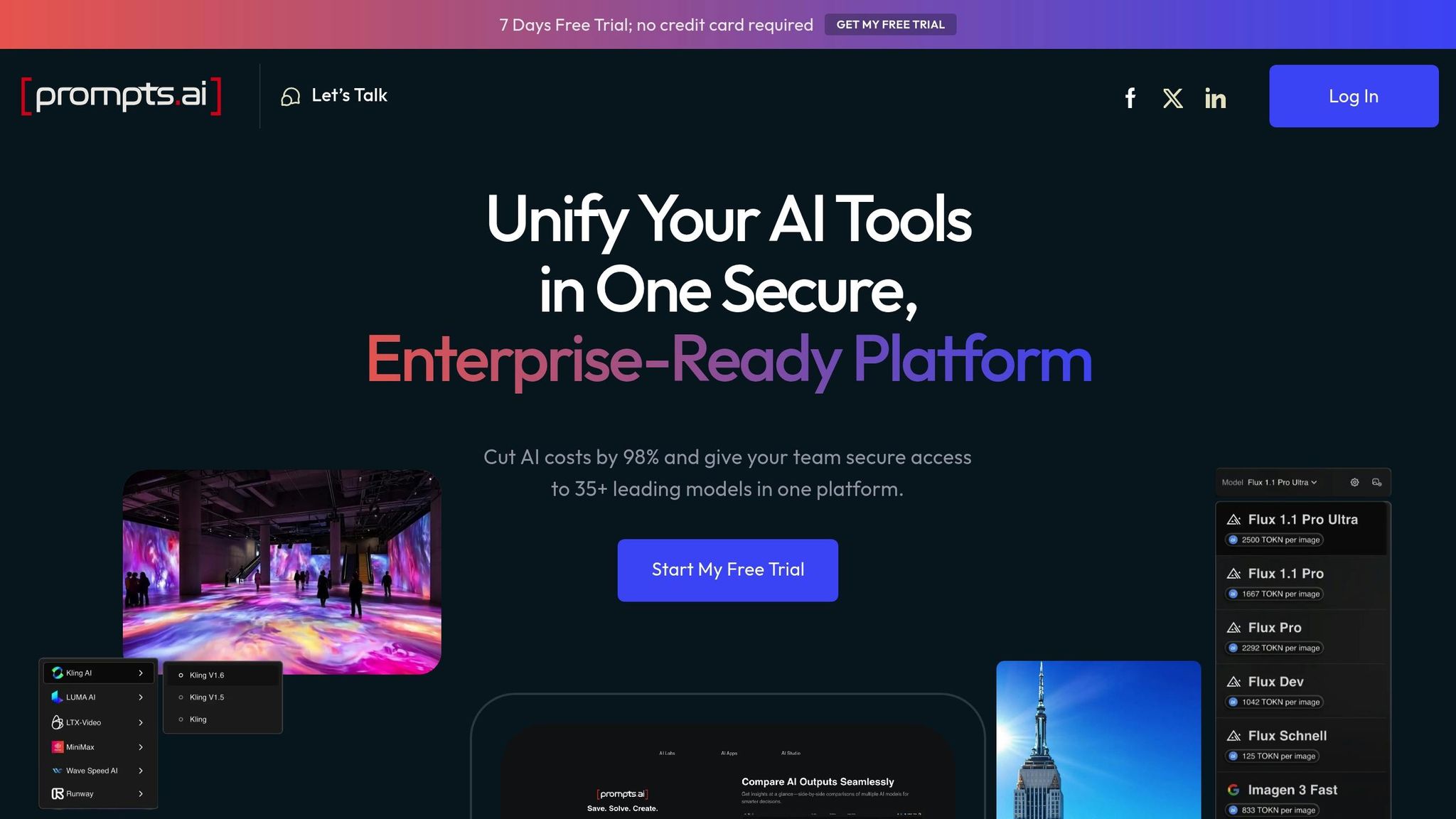
Prompts.ai simplifies AI compliance by integrating workflow management into a unified platform. It brings together 35 large language models, including GPT‑4, Claude, LLaMA, and Gemini, to deliver secure and compliant workflows. This allows organizations to maintain strong governance while scaling their AI operations efficiently.
The platform is built on a governance framework that embeds audit trails into every workflow. This ensures organizations have complete visibility and control over AI interactions across various models, teams, and use cases. Its model-agnostic design supports consistent compliance across systems, adapting seamlessly as operational needs change.
Prompts.ai centralizes audit-ready logging through its orchestration features, enabling teams to collaborate effectively while maintaining detailed records of changes and their effects on AI outputs. Automated regression and evaluation pipelines ensure that updates to prompts don't disrupt existing workflows, minimizing the manual effort needed for audit documentation.
"Prompt orchestration is essential for building consistent, reliable, and scalable AI solutions." - PromptLayer
Real-time usage tracking logs every AI interaction along with detailed metadata, making it easier to reconstruct decision-making processes during audits or compliance reviews.
The platform's API integration allows organizations to embed prompt management directly into their existing development and deployment workflows. By incorporating governance controls into current systems, Prompts.ai eliminates the need for separate tools. Its scalable design ensures that as AI usage grows, compliance standards remain consistent. The model-agnostic blueprints further support teams in evaluating and maintaining compliance across different large language models.
Prompts.ai operates on a pay‑as‑you‑go TOKN credit system, removing the burden of recurring subscription fees and lowering operational costs. The built-in FinOps feature tracks token usage and aligns spending with business goals, offering transparency that aligns with modern compliance needs. By consolidating multiple AI governance functions into a single platform, it simplifies compliance management and reduces licensing expenses.
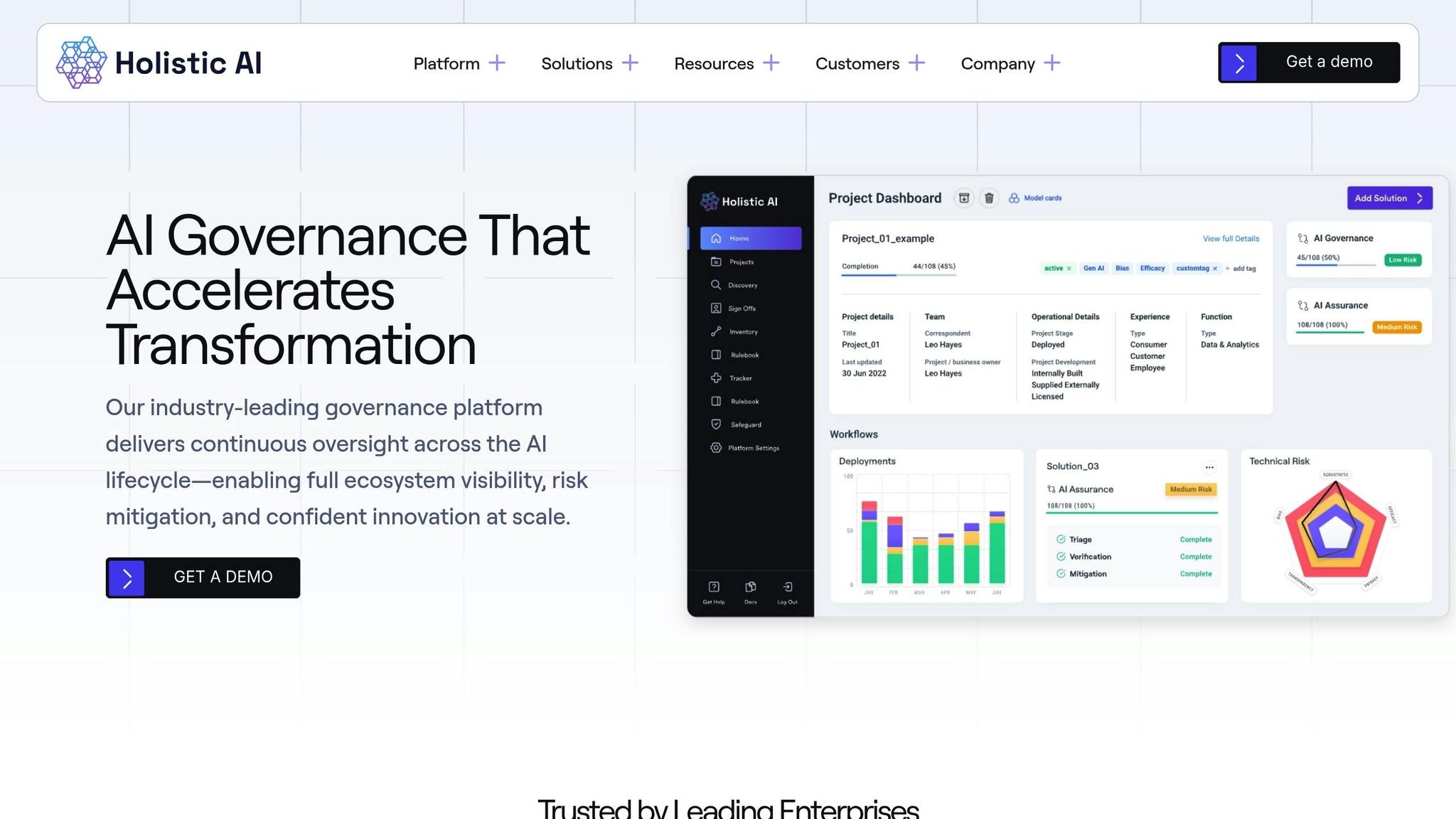
Holistic AI is a platform developed to address the challenges of managing risks and ensuring effective governance throughout the AI lifecycle. It focuses on helping organizations detect, assess, and mitigate risks through continuous monitoring and proactive oversight.
The platform ensures compliance with key regulatory frameworks by actively monitoring adherence to changing standards. This approach helps organizations maintain up-to-date compliance while also addressing broader concerns like fairness in AI systems.
With automated tools for fairness assessments, Holistic AI identifies potential biases in model outputs. This allows organizations to quickly address disparities, ensuring more equitable and inclusive decision-making processes.
Holistic AI provides detailed audit trails that document essential aspects of AI performance and compliance. These records support both internal reviews and external audits, offering transparency and accountability.
Built for enterprise use, the platform integrates seamlessly with widely used MLOps tools and cloud platforms. Its design supports scalability, fitting smoothly into existing workflows and distributed testing environments.
Holistic AI operates on a subscription model, with pricing tiers based on the organization’s deployment scale and testing needs. This flexible structure ensures that compliance investments match operational requirements.
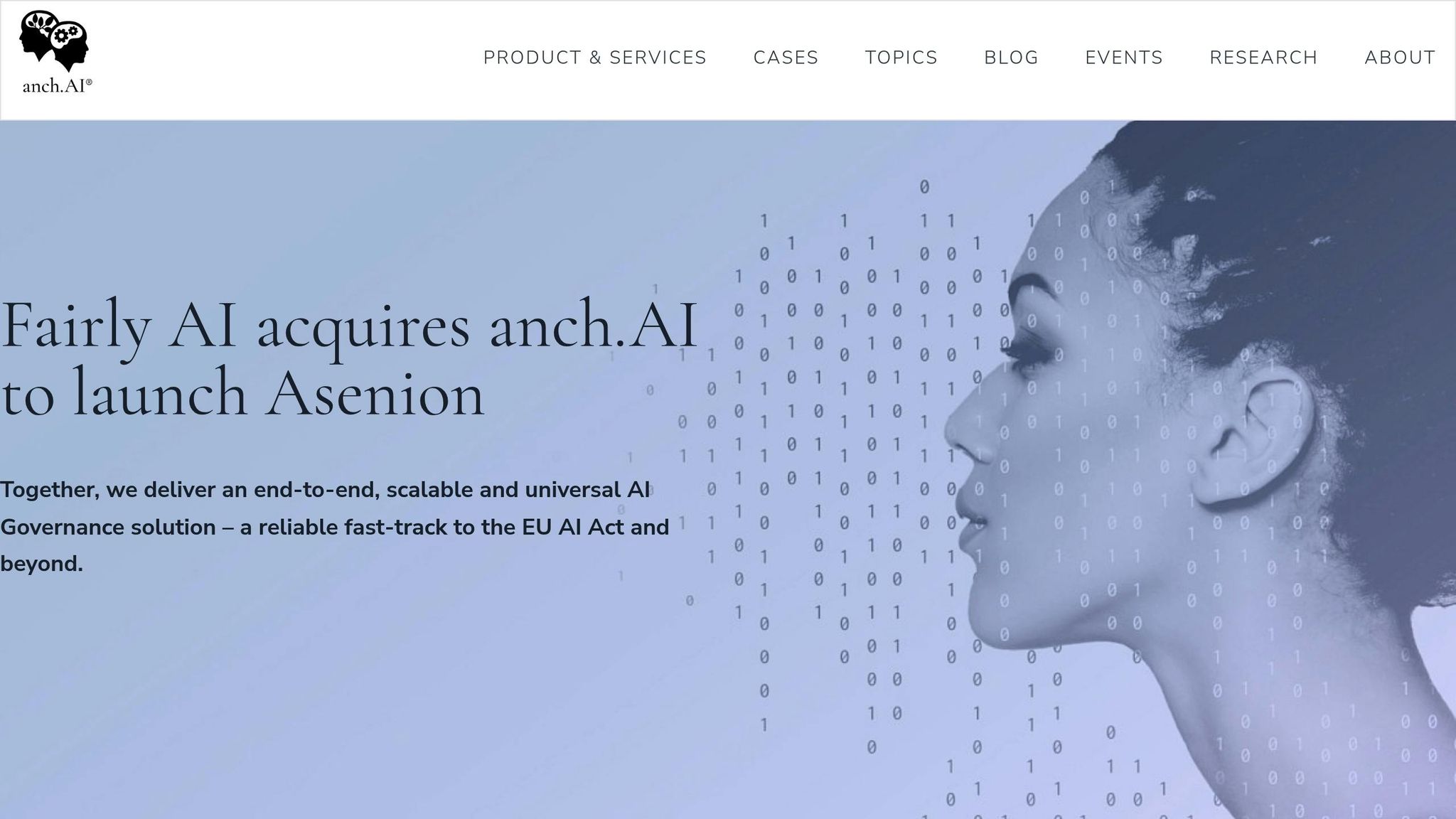
Anch.AI is a platform designed to help organizations align with the U.S. Department of Commerce's National Institute of Standards and Technology (NIST) AI Risk Management Framework 1.0 (AI RMF). By transforming regulatory requirements into actionable steps, it provides a structured way to ensure compliance across the entire AI lifecycle.
Built on the principles of the NIST AI RMF, Anch.AI supports organizations in meeting federal AI governance standards. The platform reflects the framework’s core functions - Govern, Map, Measure, and Manage - to help businesses maintain compliance while optimizing their operations.
"The U.S. Department of Commerce's National Institute of Standards and Technology ('NIST') has released its AI Risk Management Framework 1.0 ('AI RMF'). At anch.AI we are thrilled to welcome this innovation."
This focus on regulatory alignment also strengthens audit processes and facilitates the detection of bias, ensuring adherence to rigorous standards.
Anch.AI offers a comprehensive approach to auditing, with tools that measure and score AI responsibility across eight specific risks, four foundational principles, and four common pitfalls. By documenting functional requirements and assigning accountability, the platform supports both internal evaluations and external regulatory reviews.
To address issues of fairness and equity, Anch.AI integrates quantitative MLOps assessments. These tools identify potential biases and disparities early in the AI lifecycle, ensuring that diversity and inclusion remain central to development and deployment. Cross-functional self-assessments further enhance this process, aligning with NIST’s guidelines for responsible AI practices.
Anch.AI facilitates seamless collaboration across technology, compliance, and business teams by aligning reports and governance efforts. Additionally, it extends its oversight to vendors, auditing external AI risks to ensure cohesive and secure operations.
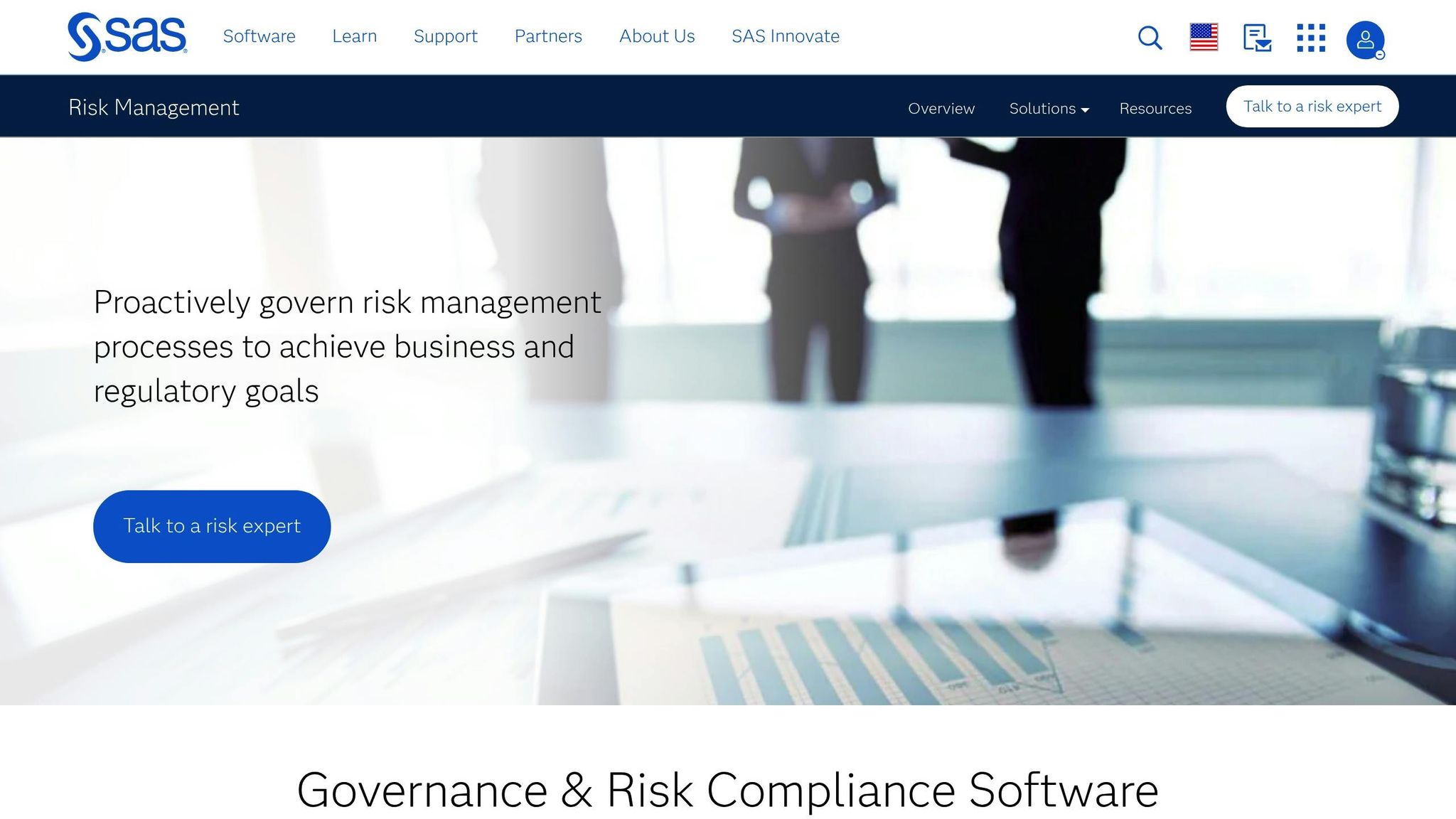
SAS Compliance Solutions provides a robust platform designed to help organizations manage the challenges of regulatory compliance in today's demanding landscape. It equips businesses with the tools needed to streamline audits, ensure adherence to regulations, and maintain seamless integration with existing data systems and workflows.
This enterprise-grade solution focuses on simplifying complex compliance processes while supporting effective AI governance. While it requires an initial investment and ongoing maintenance costs, its capabilities offer businesses a reliable way to navigate intricate regulatory requirements with confidence.
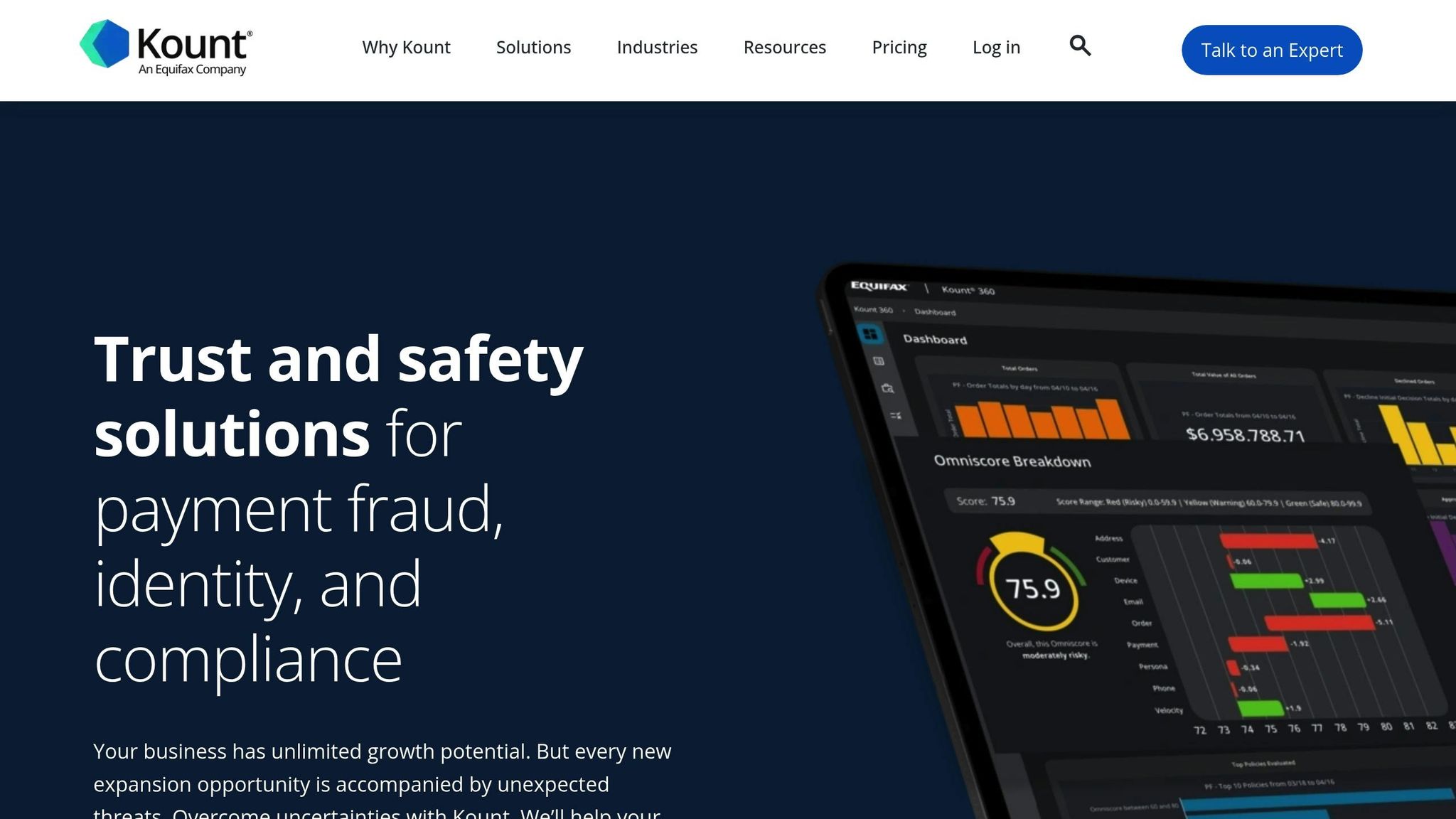
Kount is widely recognized for its expertise in fraud detection, but it also plays a key role in ensuring compliance within transaction security. This makes it an essential tool for businesses aiming to maintain strong AI governance. By combining fraud prevention with risk management, Kount not only safeguards transactions but also delivers clear operational advantages to its users.
Kount integrates effortlessly with existing payment processing systems, making it a practical choice for businesses looking to enhance their operations. Its Essentials Plan is specifically designed for Shopify and other selected e-commerce platforms, offering a flexible, tiered pricing model that caters to businesses of various sizes. This adaptability ensures that companies can scale their use of the platform as they grow.
Kount’s pricing is structured to meet a range of business needs. The Essentials Plan is priced at $0.07 per transaction, with no monthly minimums. For businesses requiring more advanced features, the Advanced Plan starts at $1,000 per month. Enterprise-level solutions are available through customized pricing arrangements. Users have reported impressive results, including a 914% ROI and an 84% reduction in labor hours spent managing chargebacks. Annual costs for comprehensive fraud detection and risk modeling typically fall between $100,000 and $800,000.
Selecting the right AI compliance tool requires a careful evaluation of its strengths and limitations, especially given the high costs of compliance, which can run into billions across the economy. Each tool offers unique features, but understanding their trade-offs is essential to balancing effectiveness and budget constraints.
| Tool | Key Strengths | Notable Limitations |
|---|---|---|
| Prompts.ai | Supports 35+ LLMs with a unified platform; includes built-in FinOps tracking for up to 98% cost savings; provides real-time governance and audit trails; pay-as-you-go TOKN credits | Primarily focuses on LLM orchestration rather than full-spectrum regulatory compliance; as a newer platform, its features are still evolving |
| Holistic AI | Offers bias detection and fairness evaluations; covers the entire AI lifecycle | Higher setup costs for smaller organizations; requires advanced technical expertise to fully leverage its capabilities |
| Anch.AI | Provides automated compliance monitoring and real-time risk assessments; integrates well with existing ML pipelines | Limited scope compared to more comprehensive governance platforms; may need supplementary tools for complete compliance |
| SAS Compliance Solutions | Excels in enterprise-level analytics and reporting; trusted in regulated industries; strong data governance capabilities | High licensing fees; complex implementation; may be excessive for smaller-scale AI deployments |
| Kount | Specializes in fraud detection and chargeback management; offers flexible pricing options | Primarily focused on transactional use cases with limited broader governance features |
These comparisons highlight the importance of aligning a tool’s capabilities with specific compliance objectives. Financial considerations play a crucial role here. For example, while California’s risk assessment regulation estimates 120 hours of compliance work in the first year, large language models suggest a more realistic range of 400–580 hours. This discrepancy underscores the need for tools that balance compliance efficiency with operational costs.
Return on investment (ROI) can vary widely between platforms, making it essential to focus on tools that address an organization’s most pressing compliance challenges. AI-driven compliance reporting enhances decision-making by providing actionable insights, but budget constraints remain a significant hurdle - 17% of HR leaders cite this as a major concern. Over-investing in unnecessary features can diminish returns, so prioritizing needs is key.
For larger organizations, ongoing costs such as maintaining dedicated compliance teams add another layer of complexity. Transparent pricing, like that offered by Prompts.ai, can help avoid hidden expenses, while comprehensive solutions like SAS Compliance Solutions demand significant upfront investments but deliver extensive coverage.
As regulations continue to evolve, flexibility becomes a critical factor. Platforms that can adapt to new requirements without incurring steep additional costs are better suited for this dynamic landscape. Tools with rigid, single-purpose functionalities may struggle to keep pace, making adaptability a valuable asset in compliance management.
Meeting U.S. AI compliance requirements is no small task, especially with regulations evolving at both federal and state levels. New laws addressing areas like automated decision-making and consumer data usage make it clear that businesses need forward-thinking strategies to stay ahead. Prompts.ai rises to the challenge with its unified approach, setting a new standard for staying compliant in this dynamic landscape.
The platform’s emphasis on integrated governance underscores the importance of managing AI responsibly. Additionally, its pay-as-you-go TOKN credits remove the burden of hidden recurring fees, while offering a secure, compliance-ready environment in one streamlined interface. With features like integrated FinOps tracking, Prompts.ai delivers cost efficiency, helping organizations save up to 98%.
In a time of rapid regulatory shifts, investing in platforms like Prompts.ai ensures not only operational efficiency but also the trust and transparency needed to navigate the future of AI responsibly.
Prompts.ai simplifies AI management by uniting more than 35 large language models (LLMs) on a single platform. This integration not only streamlines workflows but also strengthens governance and teamwork. With enterprise-level security features - such as secure API integrations and strong compliance controls - organizations can centralize their AI operations while dramatically reducing software expenses.
The platform also provides flexible solutions designed to align with specific regulatory and ethical requirements. By prioritizing transparency, accountability, and fairness, Prompts.ai becomes an indispensable resource for organizations striving to keep their AI processes compliant and responsible.
Prompts.ai enables businesses to navigate the shifting landscape of AI regulations with ease by incorporating real-time regulatory monitoring and governance tools directly into their workflows. This seamless integration ensures companies can enforce policies, monitor AI usage, and stay compliant - all without interrupting daily operations.
When it comes to managing costs, Prompts.ai employs a built-in FinOps strategy that can cut AI operational expenses by as much as 98%. This approach allows businesses to stay ahead of regulatory changes while keeping expenses under control and operations running smoothly.
Prompts.ai connects effortlessly with your current workflows by leveraging APIs to integrate with your business systems. This creates a centralized platform that offers complete transparency and ensures every AI process is fully auditable. With this setup, organizations can monitor, enforce, and document compliance seamlessly, all without interrupting day-to-day operations.
By embedding governance controls directly into AI workflows, Prompts.ai enables teams to apply policies, track usage, and maintain detailed audit trails. This efficient system simplifies risk management, strengthens accountability, and supports scaling AI governance in environments where regulations demand precision.


